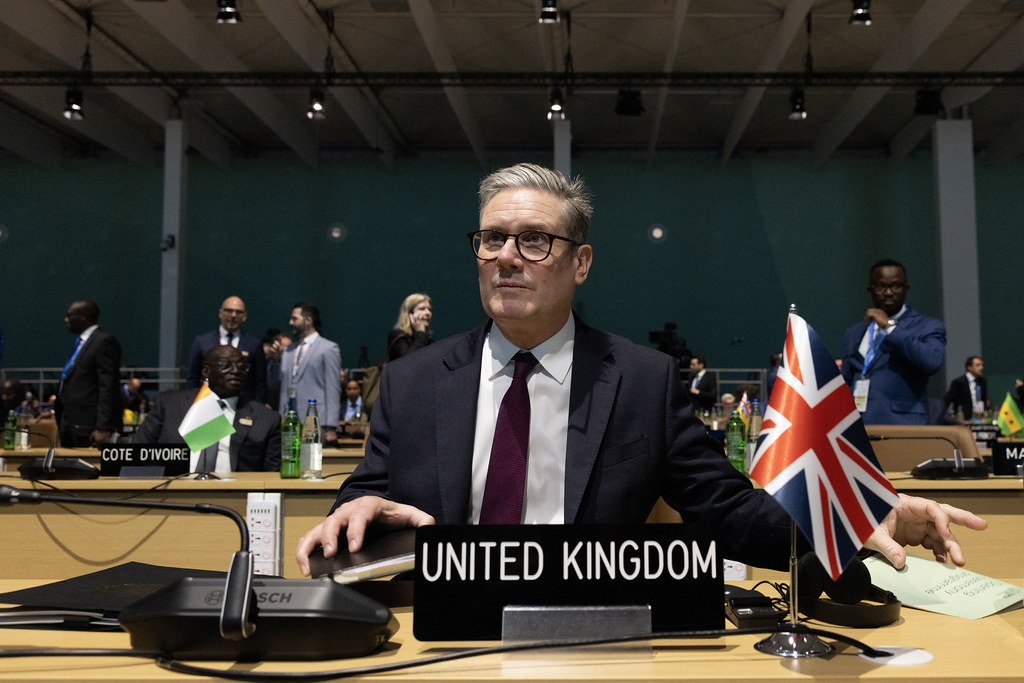Keir Starmer’s Labour government arrives with a mandate that transcends traditional political recalibration. The proposed Great British Energy represents nothing short of a revolutionary approach to national economic strategy. This is not merely a state-owned utility, but a comprehensive attempt to reimagine Britain’s industrial future through a green lens, writes Ashraf Nehal
The conference hall in Baku stood as a testament to global political indifference. While world leaders—Biden, Xi, Ursula, Modi—conspicuously absented themselves from COP29, the United Kingdom under Keir Starmer emerged as a solitary beacon of climate commitment, challenging the prevailing narrative of diplomatic paralysis. This was more than a mere diplomatic gesture; it was a profound declaration of intent, signaling a fundamental shift in how a nation can approach the most critical challenge of our time. The United Kingdom, historically a significant carbon emitter, was now positioning itself as a potential catalyst for meaningful global climate action.
The timing could not be more precarious. As global temperatures continue their relentless ascent and extreme weather events become increasingly frequent, the world teeters on the precipice of environmental catastrophe. Traditional global powers have demonstrated a remarkable capacity for inaction, transforming climate conferences into performative exercises of diplomatic theatre. Yet, in this landscape of collective abdication, the United Kingdom under Keir Starmer’s leadership offered a dramatically different narrative—one of pragmatic ambition, systemic transformation, and political courage that challenges the entire conceptual framework of national economic strategy.
This moment represents far more than a simple policy pivot. It is a fundamental reimagining of national purpose, an acknowledgment that climate action is not an optional strategy but an existential imperative that will define the economic and social landscape of the 21st century. The United Kingdom, with its complex industrial history, global financial influence, and evolving political consciousness, finds itself at a unique historical juncture. The question is no longer whether climate action is necessary, but whether a nation can truly transform its entire economic and industrial paradigm in response to the greatest challenge of our generation.

From Tory’s Stagnation to Labour’s Strategic Vision
The transition from Conservative to Labour governance represents more than a typical political shift; it is a seismic recalibration of national economic and environmental philosophy. Under Rishi Sunak’s leadership, the Conservative government epitomized climate policy contradictions—rhetorically acknowledging the environmental crisis while systematically undermining any meaningful action. In 2023, the government granted nearly 50 new oil and gas exploration licenses in the North Sea, a decision that laid bare the fundamental disconnect between political rhetoric and substantive environmental commitment. The North Sea Transition Deal, developed in 2022, was a masterclass in performative policy-making, criticized by the Climate Change Committee for having targets “significantly lower” than required to meet the UK’s carbon budgets.
This Conservative approach was characterized by a regulatory environment that actively discouraged renewable energy development. Onshore wind farm projects were systematically obstructed by bureaucratic restrictions, creating an investment landscape hostile to green energy innovations. The result was a stark misalignment between the UK’s stated climate ambitions and the practical mechanisms designed to achieve them—a deliberate strategy that prioritized short-term industrial interests over long-term environmental sustainability. Regulatory frameworks seemed designed not to facilitate green transition, but to protect existing fossil fuel infrastructure, reflecting a deep-seated resistance to fundamental economic transformation.
In stark contrast, Keir Starmer’s Labour government arrives with a mandate that transcends traditional political recalibration. The proposed Great British Energy represents nothing short of a revolutionary approach to national economic strategy. This is not merely a state-owned utility, but a comprehensive attempt to reimagine Britain’s industrial future through a green lens. The numerical commitments are both ambitious and potentially transformative: an 81% emissions reduction target by 2035, £6.6 billion allocated for home efficiency upgrades, and a commitment to achieving zero-carbon electricity by 2030. These are not just statistical targets, but a holistic approach to economic and environmental policy that recognizes climate action as the primary driver of future economic prosperity.
Implementation: The Razor’s Edge of Transformation
The most critical challenge facing Labour’s climate agenda lies not in crafting ambitious targets, but in navigating the complex terrain of implementation. Current assessments reveal a sobering reality: only 32% of required emissions reductions are covered by credible policies. This implementation gap represents more than an administrative challenge; it is a complex political and economic puzzle that demands unprecedented levels of coordination, innovation, and political courage.
The North Sea energy ecosystem embodies the intricate challenges of this transition. Generations of workers have built careers in fossil fuel industries, and a just transition is simultaneously an economic necessity and a moral imperative. Labour must orchestrate a delicate balance: maintaining economic stability while fundamentally reshaping industrial infrastructure. This requires more than policy documents; it demands a comprehensive strategy that addresses workforce development, regional economic revitalization, and technological innovation in a holistic, interconnected manner.
The financial sector watches this transformation with a mixture of skepticism and potential excitement. Can green investment truly deliver competitive returns? Can Britain emerge as the “clean energy superpower” that Starmer envisions? These are not rhetorical questions but complex economic calculations that will determine the success of this grand experiment. The transition requires not just policy changes, but a fundamental reimagining of industrial strategy, investment frameworks, and national economic priorities.

Global Implications: Beyond National Boundaries
COP29 exposed a brutal geopolitical reality: meaningful climate action is happening in spite of, not because of, major global powers. By positioning itself as a potential bridge between developed and developing nations, the UK is attempting a diplomatically nuanced approach that recognizes the global nature of the climate challenge. The UK’s emissions have already fallen by over 50% since 1990—a remarkable achievement that provides a foundation for further transformation.
Labour’s climate agenda represents a calculated gamble—a recognition that the green transition is simultaneously the greatest economic opportunity and the most significant industrial challenge of the 21st century. Jobs will be created, industries will be transformed, and national economic strategies will be fundamentally reimagined. The United Kingdom stands at a critical juncture, offering not just a national strategy, but a potential global blueprint for adaptive, sustainable economic development.
Climate change does not negotiate. It demands comprehensive, systemic responses. And in this global challenge, the United Kingdom appears prepared to offer more than rhetoric—it offers a potential pathway to transformation, challenging the global community to move beyond performative commitments to substantive, revolutionary action.
ALSO READ: Energy to bind India, Lanka, UAE
ALSO READ: Godawan Artisanal Indian Single Malt Lands in London













